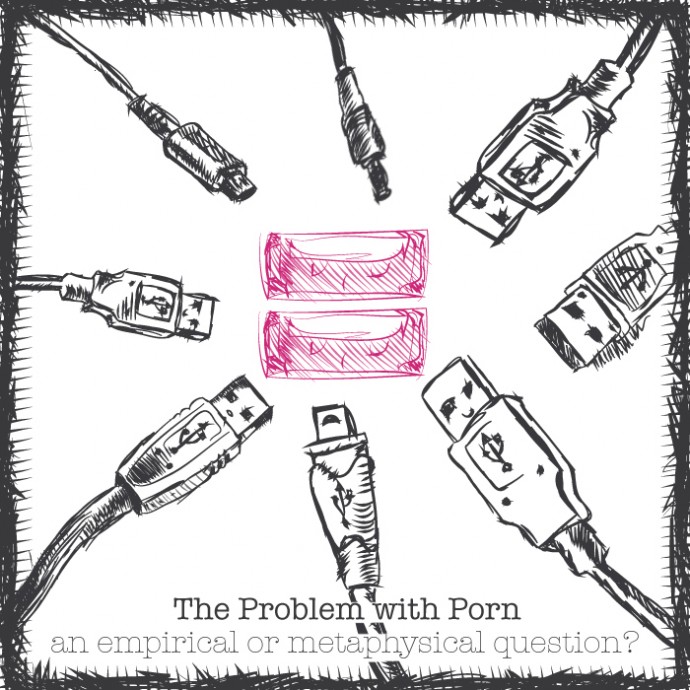Many of us have a long history of looking at pornography, a history that traces back to the pre-web era. At the same time, the horrific tales about the way the mainstream porn industry treats and depicts women tells us that there is something deeply wrong with pornography in our culture. Faced with this moral dilemma, some have suggested we should abandon porn altogether, but this is not our only option. If the problem comes from the way the mainstream industry is conducting business, then we can look beyond the narrow confines of this industry and try to find alternative ways of making and relating to porn, turning it into a tool of empowerment rather than oppression. Once regained, the effects of this brand of pornography on reshaping our sexual fantasies and the means to express them with others may be liberating.
I remember when I was thirteen years old or so, and getting hold of porn was extremely hard business. It was, after all, the early 90’s, a time when the Internet hadn’t yet arrived in our homes, and when seeing a pair of female breasts was a complicated task that took a great deal of effort and planning. More often than not, it involved someone’s older brother or cousin with a secret stash of Playboy magazines, which could be cleverly stolen and shared among us. On a few rare occasions we would even manage to get hold of something a bit spicier, delighting ourselves in cheap black and white magazines from the 80’s depicting the standard share of sexual positions.
Things, however, have changed considerably since then. With the advent of the Internet, the intermediary stage of methodic planning and eager anticipation has been removed from the experience of seeing porn. To someone born twenty years after me who is just now turning thirteen, the entire world of pornography can be accessed with a laptop, a wireless router and a subscription to an Internet provider.
But the changes brought by the Internet to pornography are not limited to wider accessibility; as more and more films are released every year, it is not hard to see that porn is also getting harder, more violent and more extreme. Compared with the sort of extreme hardcore porn one can find on the Internet today, our old black and white magazines seem almost laughable. Of course, this is not to say that extreme hardcore porn did not exist back then – it obviously did – but in our time it was the exception rather than the rule. Most of us wouldn’t have dreamed that what we see on the Internet today even existed back then. Ten-men gangbangs, bukkake, golden showers, triple penetration, you name it; there isn’t a lot out there that hasn’t been caught on camera and commercialized as porn.
Now, some people say that the relation between porn becoming more widespread and it becoming more violent and extreme is far from being arbitrary. Rather, some have suggested that it is in the essence of porn to depict the degradation and subordination of women. As writer Andrea Dworkin and lawyer Catharine MacKinnon claimed in a famous article in the eighties, “pornography is the graphic sexually explicit subordination of women” (or men, in the case of male homosexual porn, but I will limit the discussion here to heterosexual porn). If this is true, it is only natural to expect that if more and more porn is being made, it will be more and more degrading to the women involved.
This is a metaphysical statement about porn, which makes a claim about the nature, the essence, of pornography. In this sense, ‘pornography is the graphic sexually explicit subordination of women’ is similar to a sentence like ‘water is H2O’, which makes a claim about what water is, about its nature and essence. The problem with porn, in this picture, is a metaphysical one: it is in the nature of pornography to subordinate and degrade women, so insofar as we want to live in a more just society, we should seek to abolish pornography altogether.
But this is a curious position for someone to hold; how could it be in the nature of porn to degrade human beings, women specially? What is it exactly about the depiction of sexual intercourse in pictures or film that must, necessarily, involve the degradation of one human being by another?
One way to answer this question is to point out the many stories out there about the horrible way in which women are treated in the mainstream porn industry, and how these women feel degraded by pornographic films and magazines (see for example here). If one is still in doubt, a short survey of the best-selling titles of the year should suffice to bring the point home; virtually every woman who appears on the screen is depicted as infantilized and dumbed down, giggling and playing silly in the arms of the strong man who will soon take her.
These are empirical facts about porn. They tell us that, as a matter of fact, the kind of porn that is released by the mainstream industry is degrading to women. This gives us a clear picture of a very sexist mainstream porn industry, but that is different from saying that it is in the nature of porn to be degrading to women. Couldn’t one make a pornographic film outside the mainstream industry that is not degrading to women? It seems pretty clear that one can. And if this is true, then these facts do not establish that the problem with porn is a metaphysical one.
The situation is similar to the way artists are treated in the mainstream music and entertainment industry. Take the cases of celebrities like Britney Spears, Michael Jackson and many others, who have suffered serious mental breakdowns due to the pressures of the industry. These cases tell us that the mainstream music industry has a history of psychologically abusing human beings, but few of us would say that it is in the nature of music and entertainment to harm human beings. In fact, there is a whole D.I.Y music scene out there that says otherwise, with people who are fulfilled and in complete control of their music. Just as there are stories out there of women who have resisted the mainstream porn industry and found alternative ways to empower themselves through porn (see for example here).
This suggests that the problem with porn may not be metaphysical, but empirical: in other words, the problem is not that the nature of porn is to degrade women, but that the mainstream porn industry conducts things in a way that is degrading to women. If this is true, then we do not need to abolish porn altogether, but must rather change the way it is currently manifested in mainstream culture.
This sounded like good news to me. After all, I was also disgusted by the mainstream industry, but at the same abandoning all my ‘dirty pictures’ for good did not sound like a good idea either. But if I changed the way I looked and related to porn, I could perhaps get rid of the bad bathwater without throwing the baby away with it.
But in order to take a step in this new direction I first needed to look porn in a new light, beyond Dworkin and MacKinnon’s narrow definition. A more promising suggestion takes porn to be ‘the depiction, through images or words, of human sexual fantasy’. This is a more neutral definition, which leaves enough room for us to construe the sexual fantasies depicted in a more positive manner.
One consequence of this conceptual shift is that part of the responsibility for sexism in the mainstream porn industry now fall on porn consumers, a category I had always been a part of since my early teens. For if the industry is selling sexist material, this means that I, as a consumer, was partly responsible for the product’s commercial success. As ex-porn star Sasha Grey once said, the mainstream porn industry treats its audience like idiots, which is one of the reasons why she chose to leave the business for good. I didn’t want to be treated like an idiot, so I followed Sasha’s example and tried to distance myself from the industry I disagreed with.
This led me to look for porn beyond the narrow confines of the mainstream industry, to try to find explicit depictions of sexual fantasies involving people who sought to empower rather than degrade one another. But of course, telling one from the other isn’t always easy. Behind a depiction of sexual fantasy made to look as if there is no subordination involved, there may lurk in the backstage a dark story of degradation. More often than not the problem with porn is not so much what is being depicted – i.e., the contents of the sexual fantasy in question (although in many cases this is the problem) – but how it is being depicted, the conditions of production and the opportunities offered by the industry for the actors/actresses to develop and control their sexual selves.
And when we are able to find pornography that is made in this positive manner, the effect may be liberating. It has the power to take us in a personal journey to reconstruct and reshape our sexual fantasies and the means to express them with others, just as it did with mine. And if we succeed in taking back our sexuality in this manner, then the depiction of our sexual fantasies will no longer be degrading to women. It will be, instead, an expression of a renewed sexual self, which promotes mutual fulfillment rather than oppression. They will be our sexual fantasies, not the ‘innocent schoolgirl’ fantasy imposed upon us by the sexist and power-oriented culture in which we live.
Of course, before this idealized picture of pornography may be realized there are a number of difficult and important problems that need to be solved. Like any cultural revolution, this will involve not only a change in the means of production (the industry) but also a change in the contents of its products (the sexual fantasies depicted in films and magazines). But if we treat the problem with pornography as an empirical rather than a metaphysical question, we have at least some hope of getting ahead in our struggle to reclaim porn as a liberating form of sexual expression.







